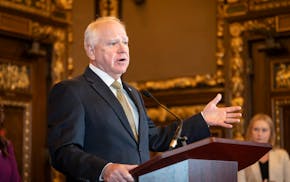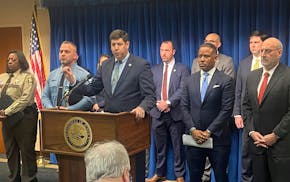Three Minnesotans are among the 39 who were granted pardons Thursday by President Joe Biden in the largest single-day act of clemency in modern history.
Another 1,500 had their sentences commuted by the president. A pardon relieves a person of guilt and punishment. Commuting a sentence reduces or eliminates the punishment but doesn't exonerate the wrongdoing.
Those pardoned Thursday had been convicted of nonviolent crimes such as drug offenses and turned their lives around, White House lawyers said.
Here are details spelled out by the White House for each of the three Minnesotans and a woman from western Wisconsin (the list of those having their sentences commuted did not include the state where they reside):
Kelsie Lynn Becklin, 38, New Brighton: Becklin pleaded guilty to a nonviolent offense at age 21. After successfully serving her sentence, she furthered her education and recently completed a Ph.D. program. In addition to her graduate program research and academic writing, she mentors previously incarcerated individuals who also seek to pursue higher education. She is also an active volunteer in her community.
Becklin was convicted of providing false information to police in connection with her role in a bank robbery in Otsego in 2007, according to court records. She was sentenced to three years' probation and four months' home confinement.
Becklin said she applied for a pardon in 2016 and was not prepared for Wednesday's phone call from the White House's Office of the Pardon Attorney.
"I immediately called my parents to let them know," said Becklin, who does research at the University of Minnesota on delivery systems for cell and gene therapy. "There was confusion at first. My dad was, 'What, what is she saying?' And my mom started crying."
Becklin recalled being interviewed by a reporter years ago about her crime, and he laughed when she told him that she wanted to get an education.
"That was motivation for me to show him," she said. "I remember the laughter."
Sarah Jean Carlson, 49, Coon Rapids: Carlson pleaded guilty to a nonviolent drug offense and received early termination of her probationary sentence. Since then, she has furthered her education and works in addiction counseling at a rehabilitation center. Carlson also volunteers in her local community and at her church.
"Shock, excitement, joy," was what Carlson said she felt upon getting the news from one of the attorneys who worked on her pardon petition, which she filed in 2020. "I was at work ... so I told everyone there. I called my husband, my kids, my mom and dad. Then I messaged everybody that I know."
She said the pardon means "I won't be disqualified for employment. ... There will be no more barriers to life. And I feel completely restored and forgiven."
Lashawn Marrvinia Walker, 51, of Minneapolis: Walker pleaded guilty to nonviolent drug offenses in her 20s. She received early termination of her probationary sentence for her exemplary probation record. Since then, Walker has worked in the health care field, is an engaged parent and regularly assists others in her community, including during the holidays when she helps serve dinner at a retirement home. "People in her community describe Ms. Walker as caring, good-hearted, and responsible. They also note her willingness to meaningfully help others."
The list also includes one person from western Wisconsin:
Audrey Diane Simon, 63, of Prescott: Simon was convicted of a nonviolent offense of providing false information to a police officer. In the years since, she has worked in the field of addiction recovery and earned a bachelor's degree and a permanent counseling license. She also contributes to her community through her church where she serves as a deacon and works in the church's prison ministry. "Community members describe her as inspirational, trustworthy, positive and caring."
Among the numerous Minnesotans who had their sentences commuted was 41-year-old Kelli Caron. In 2020, Caron became the first person in nearly three decades to have her state sentence commuted by Minnesota's Board of Pardons while still in prison.
But a concurrent federal drug sentence in a meth conspiracy case from North Dakota sent her farther away from family to a prison in Alabama.
The Little Canada native petitioned the Biden administration for federal clemency, arguing that recent federal sentencing law changes have rendered her original sentence overly long.
During her addiction, Caron picked up multiple state drug possession charges. That allowed federal prosecutors in North Dakota to seek an enhanced penalty carrying mandatory life imprisonment if convicted at trial in the 2015 drug distribution case.
Caron pleaded guilty to avoid risking a lifetime sentence. Her clemency petition argued that Caron's past drug possession convictions could no longer be used to calculate such a lengthy term were she to be sentenced today under new guidelines passed in 2018. Caron has been out prison for the past two or so years.
JaneAnne Murray, an attorney and University of Minnesota law professor who filed Caron's petition, said Thursday that her U Law School Clemency Project won six clemencies in all, including Caron's.
"These individuals have been thriving in their communities and it would be cruel to return them to prison," Murray said. "We hope, however, that the president will now turn his attention to the tens of thousands still in prison serving unjust and outdated sentences."
The Associated Press contributed to this report.

Accomplished climber, photographer who recently moved from St. Paul missing on mountain

Walz: State had no advance notice of federal raid in Minneapolis

DOGE cuts federal money for upgrades at Velveeta plant in New Ulm

Five members of Minneapolis Highs street gang found guilty of racketeering conspiracy
